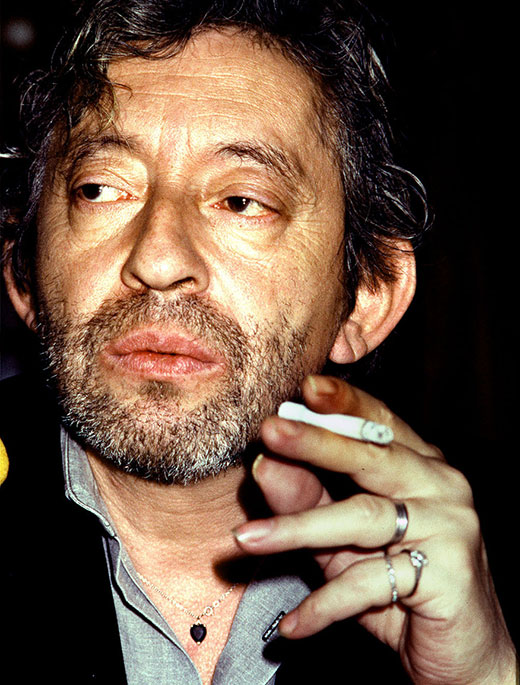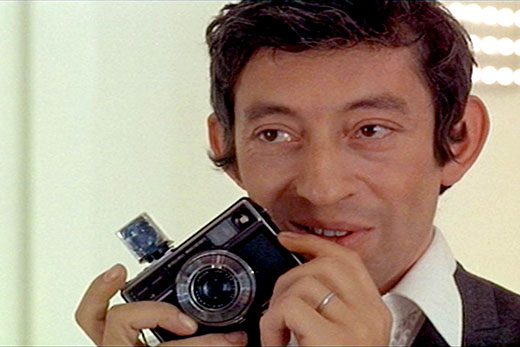News of France's Bastille Day horrors arrived too late for last week's deadline.
So, slightly belatedly, I thought we'd make this week French Week and look at a great French singer.
Serge Gainsbourg.
There are a lot to choose from, from the iconic Johnny Hallyday to Francoise Hardy – or Plastic Bertrand anyone? And the ever-astonishing Charles Aznavour, still going strong at 92. But my favourite is Serge Gainsbourg.
A well-known piece
I'm guessing that many readers don't know a lot of songs in French. There are about three songs widely familiar to native English speakers.
There's ‘Alouette', Bill Wyman's ‘Je Suis Un Rockstar' perhaps, and the third is from Serge Gainsbourg. A song that represented one of the many times he scandalised France and, unusually in this case, the world.
‘Je T'Aime Moi Non Plus' – that breathily whispered ultra-sexy seduction piece set to pulsing organ crescendos – was banned in the United Kingdom, Spain, Sweden, Brazil, Italy, Portugal and more.
From the late-1950s till the early-1990s, Serge Gainsbourg was the most famous singer and songwriter in France. His own albums and recordings rarely topped the charts but he, in a manner that seems almost unique to France, wrote prodigiously for beautiful actresses.
He wrote for Brigitte Bardot, Jane Birkin, Isabelle Adjani, Honor Blackman, Catherine Deneuve, Zizi Jeanmaire, Anna Karina, Vanessa Paradis, and many more, often full albums.
Starting scandal
One of those early commissions caused his first big scandal. After writing the 1965 Eurovision Song Contest winner for 16-year-old France Gall he followed it with ‘Les Sucettes' (Lollipops) a hit on which the young singer seemed the only person unaware that the lyric appeared to about more than simply sucking a lollipop.
Serge was unusual and an unusual-looking guy. Son of Russian-Jewish immigrants, he had big ears and a lifelong addiction to alcohol and cigarettes. His mid-1960s affair with Brigitte Bardot put him firmly on the front pages. He wrote an album for her – of course – and she recorded ‘Je T'Aime Moi Non Plus' with him.
But the affair ended and she barred the song's release. He rebounded, into the arms of the young and lovely Jane Birkin, wrote an album for her, and rerecorded that song for his only worldwide hit.
Then, in 1971 with Jane as his muse, he released what many regard as his masterpiece, ‘Histoire De Melody Nelson', using top English rock session musicians and creating what sounds like acid jazz decades before its time.
Seeking new sounds
Looking for new sounds Serge travelled to Jamaica in 1979 to record with Sly and Robbie and the I-Threes.
The resulting album introduced mainstream France to reggae, and scandal once again ensued. The title track was a reggae version of French national anthem ‘La Marseillaise'. It got the same reaction as The Sex Pistols' ‘God Save the Queen' in England. Veterans marched on the French parliament to return medals; Serge's shows were disrupted by rioting paratroopers. But Serge continued his musical restlessness. In the 1980s he recorded in America with musicians in the axis of Bruce Springsteen and Southside Johnny.
He combined French dancefloor with his inimitable punning, outrageous, confrontational lyrics.
Those lyrics? Wow. Beautiful, surprising, profound and…sometimes not. He wrote an album which was mainly 'fart songs”; his ‘Rock Around the Bunker' album crudely satirised the Nazis. It was a very fine line between high art and low comedy.
A final drama
One last scandal. In the mid-1980s Serge was on a live TV talk show with Whitney Houston and clearly drunk. Being interviewed together, he leaned over and made an obscene suggestion. The flustered interviewer tried to explain: 'What Mr Gainsbourg means is he thinks you're great...” 'No,” repeated Serge, 'I would like to **** you”. True story – you can watch it on YouTube. And, despite all that, I urge you to listen to Serge's music, from the early nightclub chansons to the slick sixties pop and the bare-bones reggae.
Best place to start is any compilation, and the best accompaniment to the originals are two albums by Australian musician Mick Harvey, one of Nick Cave's Bad Seeds.
‘Intoxicated Man' and ‘Pink Elephants' both translate Serge's songs into English and both are brilliant.
Posted: 09:10am Fri 22 Jul, 2016 | By Winston Watusi watusi@thesun.co.nz
Honouring French singers

27-Apr 08:00
What's on - repair cafe, markets and art
27-Apr 07:30
Collective in desperate need of funds
27-Apr 06:50
Freedom found on court and field
26-Apr 20:00
Some after-hours clinics on verge of collapse
26-Apr 19:00
Vape rules: Loopholes will be exploited - expert
26-Apr 18:00
Artificial turf theft upsets Rotorua cricket boss
26-Apr 17:00
Work ahead on State Highway 5
26-Apr 16:00
Tina Salisbury to run for Tauranga mayoralty
26-Apr 15:01
Nominations open for Tauranga Council elections
26-Apr 14:00
Fire at Good Local Pyes Pa closes business
26-Apr 13:00
Restaurant reopens after car crashes in
26-Apr 11:45
New multi-million dollar robot for Grace Hospital
OPINION POLL
Where should Tauranga CBD's permanent bus stop be located?
LATEST JOBS
Frozen Fish Packers
We urgently need frozen fish packers. This is working between 2 to 5 days a week.Day shift only.This role will involve:*...
View or Apply on GoodWork.co.nz
Weed Spraying until Christmas
We are looking for two hard working and committed general labourers to take on a weed spraying and weed eating position monday-friday...
View or Apply on GoodWork.co.nz
Factory hand on a production line
We have a family owned business based in Mount Maunganui expanding their processing plant and are seeking factory staffThis...
View or Apply on GoodWork.co.nz
Finish Department Assembler
Our Client is looking for an Assembler for their finishing department. This role is based in Tauranga and will be an immediate...
View or Apply on GoodWork.co.nz
Maintenance labourer
We are needing someone who has either maintenance or building experience to join a local crew that help keep public areas...
View or Apply on GoodWork.co.nz
Site clean up
Large construction company needing a crew of site cleaners to help keep the area hazard free. Tasks include cleaning up building...
View or Apply on GoodWork.co.nz
Meat factory hand
Packing, de-tray and roles available, based in Tauranga CBD.No experience needed, all you need is the keenness and reliability...
View or Apply on GoodWork.co.nz
2 x Commercial Planters needed for 4 weeks
We are looking for experienced planters for a large commercial job in Omokoroa; that will be for 4 weeks.This is will be...
View or Apply on GoodWork.co.nz
Warehouse Labourer
We are needing 4 x labourers to work at Tauranga PortYou will be helping to stencil numbers onto product and clean down trucks.Your...
View or Apply on GoodWork.co.nz
Digger Operator
We are seeking a hard working and reliable machine operator to work as a digger operator on a locally based project until...
View or Apply on GoodWork.co.nz
Forklift Operator
We are looking for a Forklift Operator with a current OSH forklift license. You will need to be physically for as the job...
View or Apply on GoodWork.co.nz
Storesperson
Do you have Warehousing experience? Do you want to work for an expanding company that champions its employees? Then I have...
View or Apply on GoodWork.co.nz
Meat factory hand
Packing, de-tray and roles available, based in Tauranga CBD.No experience needed, all you need is the keenness and reliability...
View or Apply on GoodWork.co.nz
Civil Construction Labourers
Work is available with great hours and asap starts! Civil Labourers urgently needed for a variety of different jobs on different...
View or Apply on GoodWork.co.nz
Class 4 Driver
2020 been terrible and want a fresh start for the New Year....?We have a great opportunity for an experienced Class 4 Driver...
View or Apply on GoodWork.co.nz
Administrator
The CompanyOur client is a tight-knit, Kiwi owned business who have grown tremendously. They provide commercial events and...
View or Apply on GoodWork.co.nz
Warehouse Staff need ASAP
Are you looking to join a company who looks after their staff, have a great working environment and work hard and play hard?...
View or Apply on GoodWork.co.nz
Class 5 Driver
Our client has an opportunity for a Class 5 Driver, delivering product to customers from their leading manufacturing company...
View or Apply on GoodWork.co.nz
Project Administrator
Do you want to work for one of the most well respected contractors in the business? Work on one of the most exciting long...
View or Apply on GoodWork.co.nz
Landscaping Specialist
Our Client has been operating from the Bay of Plenty across the upper North Island for the last 25 years, specializing in...
View or Apply on GoodWork.co.nz
Class 5 Logging Driver
We have a fabulous opportunity available for an experienced Class 5 Driver to join a new company based in Tauranga.This role...
View or Apply on GoodWork.co.nz
Area Maintenance Manager
Are you a seasoned mechanical engineer with a strong manufacturing background? You have leadership experience but are looking...
View or Apply on GoodWork.co.nz
General and Civil Labourers
We are currently looking for individuals to assist our clients with general labouring that involves manual labour and machine...
View or Apply on GoodWork.co.nz
Roller Operator - TAURIKO
Have you been waiting for a company to give you the chance to use your roller ticket?CALL US FOR AN IMMEDIATE START.You will...
View or Apply on GoodWork.co.nz
Green Spaces Labourer - full training provided
Work is available with a large civil company in their Green Spaces team, mowing commercial lawns, gardening, weed eating...
View or Apply on GoodWork.co.nz
Logistics Administrator
On behalf of our well known and highly regarded client, we are looking for a team player to join their team immediately....
View or Apply on GoodWork.co.nz
Brick Stacker/Packer
Our local client manufactures high quality bricks and is in urgent need for new team members to help with their high demands.This...
View or Apply on GoodWork.co.nz
Sandblasting assistant needed asap
Our Mount based client is looking for 2 full time staff members to jump on board as sandblasting assistants. if you have...
View or Apply on GoodWork.co.nz
Roading Season! Labourers and Class 2 drivers
Our Rotorua project is looking for a needing fit and reliable labourers for the busy Summer season that has just kicked off....
View or Apply on GoodWork.co.nz
Traffic Management Planner
We have an exciting opportunity for an experienced, customer-focused TMP Designer for our client with offices throughout...
View or Apply on GoodWork.co.nz


0 comments
Leave a Comment
You must be logged in to make a comment.